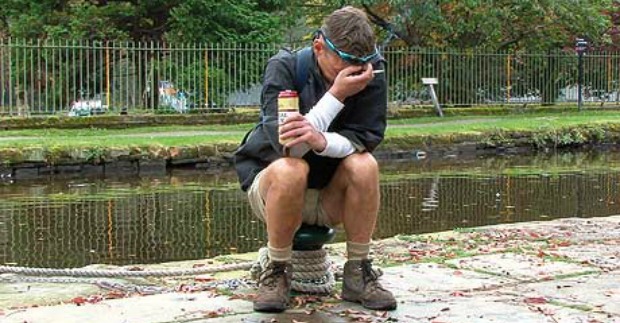Shed Your Tears and Walk Away
Shed Your Tears And Walk Away is one man’s desperate bid to save his childhood friends from death.
Plot summary
Real-life drama about why, in a beautiful and quirky rural town, filmmaker Jez Lewis' childhood friends are killing themselves. Beginning with a personal quest for understanding, the film moves into a year-long drama of human tragedy and redemption as principal character Cass comes to terms with his own mortality and attempts to lift himself out of his cycle of self-destruction.

For his first feature film, documentary filmmaker Jez Lewis has daringly chosen an intensely personal subject. At first glance, Shed Your Tears And Walk Away is a rather unpolished documentary, grainy, shakey, raw; a second, closer look reveals a human drama fraught with aching torment, regret and futility. But beyond these filmic tropes, what actually lies at the centre of this project is one man’s desperate bid to save his childhood friends from death.
Hebden Bridge is a small former mill town nestled snugly amid two giant clefts of Pennine rock in West Yorkshire. Renowned as something of a Bohemian idyll, Hebden Bridge boasts a thriving tourist trade and is a magnet for artists, poets, artisans, and Children of the New Age. Lewis returns to his childhood home ingrained with the halcyon memories of youth to find a rather altered place. Having attended a sickeningly steady flow of funerals, Lewis tries to ascertain why all of his friends are dying, either by suicide, drugs or drink. Why all these deaths in this rural paradise? What has drained these people’s will to live? What seemingly paranormal curse hangs over this small hillside community?
In the roughly one year that Lewis spends visiting Hebden, his protruding DV camera is a constant extension of his head. Wherever he goes, whatever chats he has with his friends – some intensely personal – are documented. From the off, we are thrust into the nucleus of this group of alcoholics, smack heads and dope fiends – the kind of gang you might see in a park anywhere in Britain and fervently avoid, dismiss immediately as dropouts, bums and wreck-heads. Lewis, known to all in this bedraggled, crusty mass affectionately as Jez Mate, bursts through any pejorative preconceptions, dragging us with him. Instead of looking from a safe distance at nameless, faceless lost souls, we meet real human beings. At the centre of the film is Cass, Jez’s oldest and closest friend, and the father of the group. Having been given two years left to live if he carries on as normal – never without a can of Special Brew in hand – Cass is either unwilling or too frightened to save himself. Several times Jez takes Cass to various rehab clinics, only to find that days or weeks later, Cass is back in the park, pissed as a fart. He isn’t a totally lost cause, Jez can see this, but his constant backsliding is a source of constant pain and frustration for the filmmaker. Like a lot of the guys we meet, Cass is sharp, witty and very likeable. The tenderness and camaraderie shared between these guys is unmistakably sincere, truly touching.
As Jez is locked in constant struggle to help Cass right himself, he also spends much of his time with some of the rest of the gang. Cass’s best friend Silly, another charming but tragic figure is also downward spiralling. More aware than the others of his own problems, Silly tramps through life in a pissed, soft blur, content at the lack of – or more accurately -obliviousness to his responsibilities. Like Cass, he is a former heroin addict. Liam, in his mid twenties, vents to the camera the pain at having lost his brother Sam to heroin overdose days before vows never to shoot up again. Days later, he’s on the phone organising his ‘next meal’.
Ordinarily, representations of drug addicts and alcoholics are treated with a cool, professional distance. It is both refreshing and difficult to be foisted this intimately with crippling addiction. Both drug and drink addictions are very easy to criticise, but until you realise that these people are sons, daughters, fathers, you cannot quite grasp the ramifications and consequences that these illnesses hold. What is staggeringly tragic about this case, is the disproportionately high concentration of such illnesses and addictions in one place. Over the course of the film’s production, at least five names are added to the list of suicides and overdoses. It becomes exhausting.
A conclusion is never really reached, only the crushing affirmation of a self-perpetuating cycle of misery and masochism. Beneath the handsome sand coloured diagonals of this picturesque village is a black hole, ever expanding, sucking the young and old alike into its poisonous abyss. Whether Jez found that chronicling it was a cathartic release or more of a catalyst for his own intervention into the salvation of his fading friends, it is certainly affecting to the outside viewer. It is impressive that Jez filmed the whole thing himself, no mic booms, no gaffers or assistants, no superfluous extra-budgetary flourishes; though it looks rough and at times sounds shoddy, it doesn’t detract from the overall effect. It is a film that could only have been made by him, a trusted friend of these people. At times we might feel intrusive, useless, extraneous, but it doesn’t stop us from engaging deeply with these calamitous characters.











COMMENTS